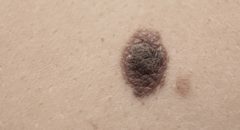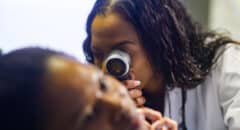
Skin cancer has been a hot topic lately. Are Blacks at risk? How do you get it? What does skin cancer look like? Contrary to popular belief — that the high levels of melanin (a protective pigment) in our skin prevent us from getting cancer — that’s just not true. While skin cancers are mainly associated with ultraviolet (UV) radiation from the sun or tanning beds, and many people of color are less susceptible thanks to their UV-blocking melanin, everyone (even Black Americans) are at risk.
RELATED: Men & Melanoma: What To Know Before Going Shirtless This Summer
In fact, many Blacks are unaware of a skin cancer that primarily affects dark-skinned people — acral lentiginous melanoma (ALM), an aggressive cancer that disproportionately afflicts Black Americans and other dark-skinned people.
Unfortunately, because Blacks often assume they’re immune to the “Caucasian disease”, their cancers tend to be diagnosed at a more advanced stage, meaning a bleaker outcome.
So, considering most adults have between 10 and 40 moles dotting their bodies, how can you tell a beauty mark from skin cancer?
Signs of Skin Cancer to Look Out For
Here’s what to look for…
- If it’s pink, flaky, located on the face, hands, or arms and appears to grow back rapidly, it could be Actinic Keratosis. According to dermatologist Ellen Marmur, MD, 20 percent of these cases involving “precancers” are mistaken by patients as eczema reports Prevention.
- If it’s pink, shiny and typically on the head, neck, or ears, it could be Basal Cell Carcinoma. This is the most common skin cancer. Although it rarely spreads away from the origin of a tumor, growths on ears or lips can extend to the lymph nodes and lungs.
- If it’s red, flaky, raised; and develops on the head, neck, ears, lips, hands, or arms it could be Squamous Cell Carcinoma. These lesions look like sores. When found on the lips and ears, they have a higher risk of metastasis. In very rare cases, the cancer can be fatal.
How to Prevent Skin Cancer
Thanks to the many evolutions in sun protection, this can all be avoided if you take the necessary steps to protect yourself. So how do you prevent skin cancer?
- Put on sunscreen 10 minutes before exposure and every two hours outdoors.
- Don’t neglect your head! The scalp, hair part, and ears are often overlooked. Sprays or sticks can help reach those areas.
- Eat red. According to the British Journal of Dermatology, women who ate two ounces of tomato paste daily experienced less radiation-induced skin damage than those who didn’t.
- Have your car fitted with UV-blocking film.
- Have a cup of Joe. A Harvard Medical School study once found that women who drank three cups of caffeinated coffee daily were less likely to have basal cell carcinoma than those who skipped their morning cup of get up and go!
- Wear hats and lightweight, protective clothing.
RELATED: 6 Common Places You Forget To Apply Sunscreen
As always, if you feel that you are at risk or may have developed an unidentifiable skin condition, it is always wise to consult your dermatologist – sooner than later.









